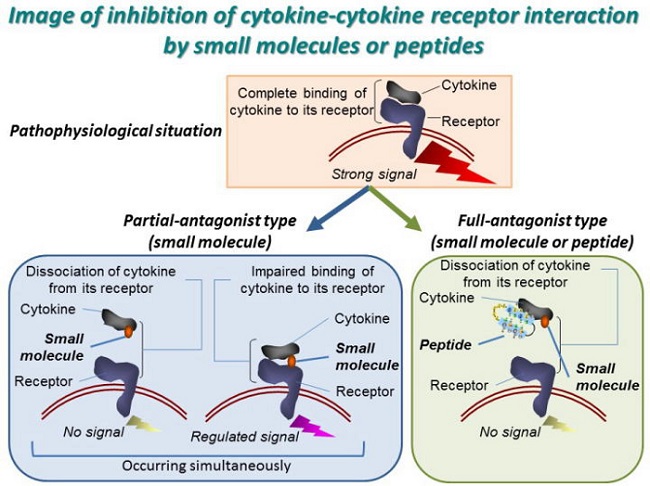- Top
- Business Overview
- Business Strategy
Business Strategy
Strategy for drug discovery targeting protein-protein interaction (PPI)
Summary
Interprotein's business focus is the development of small molecules that interfere with PPIs. Recent epoch making progress in biotech and pharmaceutical industries has come from the use of monoclonal antibodies for the treatment of significant diseases including cancer and autoimmune diseases such as rheumatoid articles and IBD.
Monoclonal antibodies are the only proven pharmaceutical therapeutics for inhibiting PPIs strongly associated with diseases eg. A representative instance is inhibition of TNF-TNF receptor interaction by Infliximab, adalimumab and so on for rheumatoid arthritis, and some such products have grown into brockbuster drugs.
Thus blocking PPI by antibodies has been clinically proven and are significantly effective to treat and prevent progressions of many diseases several hundred monoclonal antibodies are on the market or currently in clinical trials.
Although the effectiveness of monoclonal antibodies has been established, those are relatively expensive for patients and must be given by injection. If orally active small molecule PPI inhibitors for the targets of the monoclonal antibodies can be obtained, it would provide reduced costs goods and improved acceptance for patients.
Our approach is to design small molecules by our novel method to achieve the same clinical outcomes as established antibody products. We have developed a method to identify small molecules to inhibit PPIs with high specificity and potency. We have successfully created new chemical entities interfering with PPI both in-vitro and in-vivo. We are committed to delivering highly innovative therapeutics with affordable drug prices and versatility.

Selection of targets with Proof of Concept
We believe that successful drug development depends on the wise selection of the targets for which patients need alternative drugs to current approach with biologics. From this point of view, we have first chosen the PPIs of interactions of IL-6, IgE and VEGF with each receptor. These molecules have been clinically validated as important theraputic targets by antibody drugs such as tocilzumab, omalizumab and bevacizumab, respectively, but no orally active small molecule had been identified or these targets. Interprotein believes that this approach should give us much higher success rates in developing and commercializing our products than industrial averages.
Our belief is "Consider the advantages of small molecule compounds!".

Antibody drugs and several other biologics have proven the clinical rationale for targeting PPIs. It is truly epoch making approach that has provided better QOL for patients with diseases which had been never treated well before. Despite this benefit, there are major concerns on significant increase of medical costs and inconvenient usage of drugs due to limitation of administration route of biologics. High medical costs hamper application of those drugs to broader range of diseases and patient?fs access to drugs particularly in the developing coutries. In addition, monoclonal antibodies can be only used to inhibit extracellular PPIs,i.e., secreted proteins or cell surface molecule such as receptors,adhesion molecules and CD(cluster of differeniation) molecules. Interprotein can create drugs that also inhibit disease-associated PPIs including signal transduction molecules and transcription factors. Our mission for PPI projects is to provide therapeutic benefits to all the patients in the world through developing small molecule inhibitors.
International Collaboration
We are actively seeking collaboration partners for our drug discovery projects. We are talking to companies including several global pharmaceutical companies for future collaboration opportunities.
